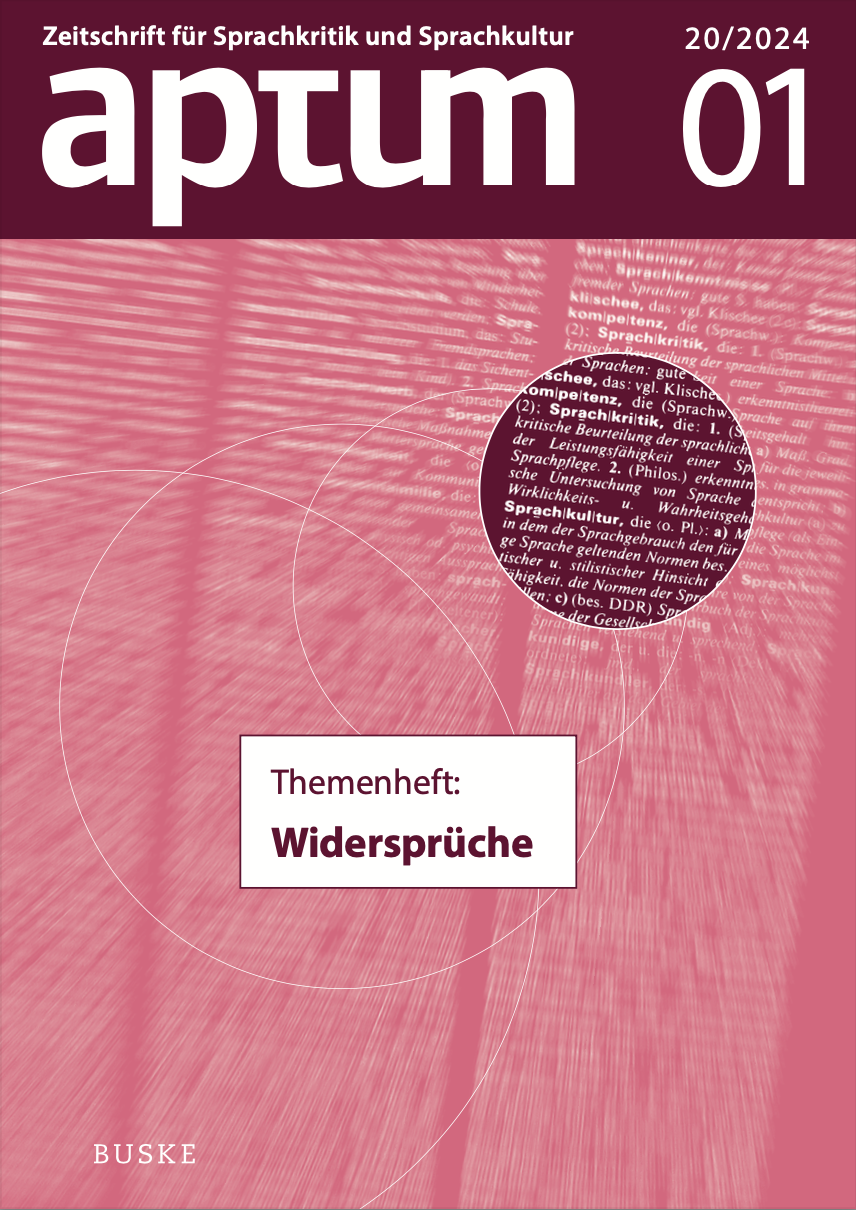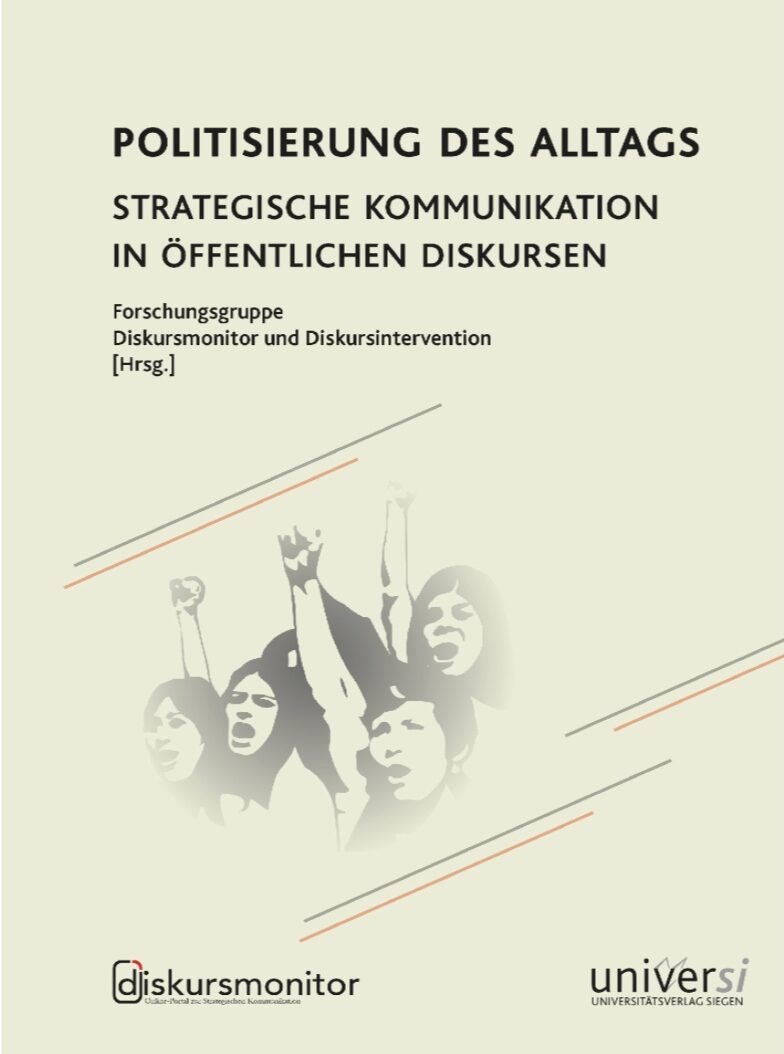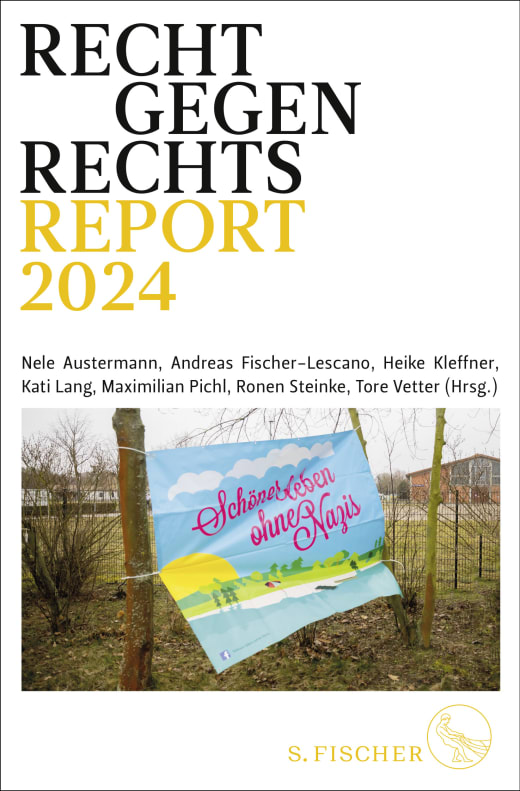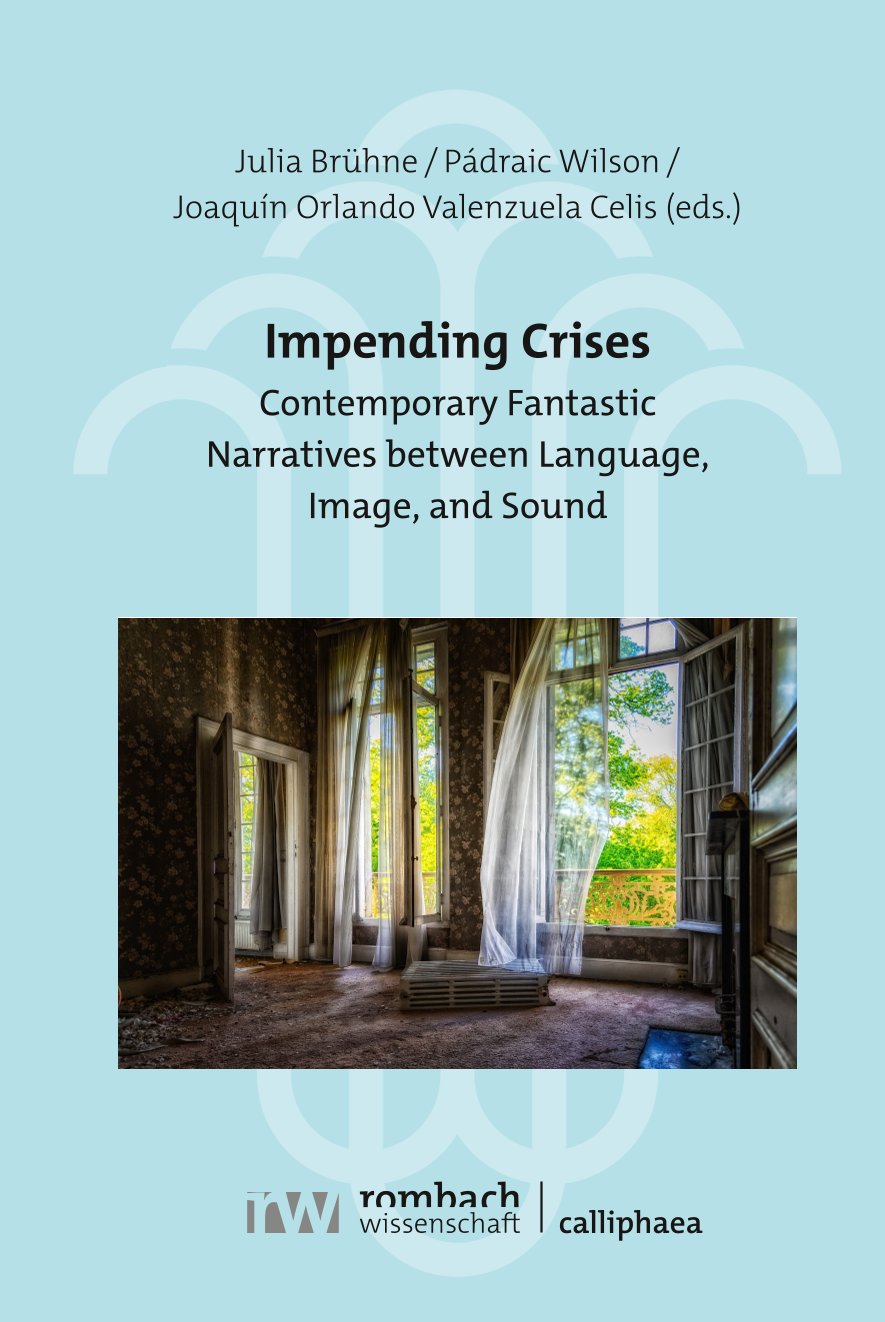Beiträge
-
 (Noch) nicht verboten, aber unvereinbar (Teil II). Zum Ausschluss von AfD-Mitgliedern aus einer Gewerkschaft
(Noch) nicht verboten, aber unvereinbar (Teil II). Zum Ausschluss von AfD-Mitgliedern aus einer GewerkschaftLaut Bundesamt für Verfassungsschutz (BfV) ist die AfD mittlerweile „gesichert rechtsextremistisch“. Sie vertritt Positionen, die den gewerkschaftlichen Grundwerten fundamental widersprechen. In diesem zweiten Teil werde ich zeigen, dass auch der Gewerkschaftsausschluss von AfD-Mitgliedern möglich ist – anders, als eine kürzliche Entscheidung des LG Berlin II vermuten lässt.
-
 Declarative Speech Acts as a Discursive Practice of Disruption. An Analysis of Same-Sex Marriage and Blessings in German Church Discourse.
Declarative Speech Acts as a Discursive Practice of Disruption. An Analysis of Same-Sex Marriage and Blessings in German Church Discourse.This paper discusses how the category of declarative speech acts can be used in the context of discourse analysis. For this purpose, similarities as well as differences between the works of Searle and Foucault are being discussed in order to illustrate the possibilities and challenges of theorizing declarative speech acts as discursive practices. To elaborate on these problems, a study on the felicity conditions of marriage in Islamic as well as Christian cultures is critically reviewed. The paper ends with an analysis of the discourse of same-sex marriage as well as blessing ceremonies in German churches and the discursive conflicts revolving around those practices.
-
 Disruptive und diskursive Ereignisse. Ein Vorschlag zur Ausdifferenzierung mit Beispielen aus dem feministischen Abtreibungsdiskurs Disruptive und diskursive Ereignisse
Disruptive und diskursive Ereignisse. Ein Vorschlag zur Ausdifferenzierung mit Beispielen aus dem feministischen Abtreibungsdiskurs Disruptive und diskursive EreignisseVor dem Hintergrund von Disruption werden in diesem Artikel geltende Konzepte von diskursivem Ereignis hinterfragt und miteinander in Beziehung gesetzt. Die davon abgeleiteten disruptiven Ereignisse werden als eine Subkategorie von diskursivem Ereignis verstanden. Am Beispiel des feministischen Abtreibungsdiskurses wird diesem Ansatz gefolgt und mittels einer Analyse von Praxen des Widersprechens ermittelt, inwieweit durch feministische Akteur*innen die Urteile des Bundesverfassungsgerichts von 1975 und 1993 als disruptive Ereignisse konstruiert werden.
-
 (Noch) nicht verboten, aber unvereinbar (Teil I). Zur Unvereinbarkeit der AfD mit Gewerkschaften
(Noch) nicht verboten, aber unvereinbar (Teil I). Zur Unvereinbarkeit der AfD mit GewerkschaftenDie Alternative für Deutschland (AfD) vertritt Positionen, die den gewerkschaftlichen Grundwerten widersprechen. Die gewerkschaftliche Interessenvertretung von Beschäftigten ist mit einer Mitgliedschaft in der AfD nicht vereinbar. Gewerkschaften dürfen die AfD deshalb per Unvereinbarkeitsbeschluss zu einer gegnerischen Organisation erklären und Mitglieder ausschließen, die zugleich Mitglied der AfD sind – und sollten das auch tun.
-
 „Man kann sich nicht gleichzeitig für Feminismus und Freiheit einsetzen.“ Zur diskursgrammatischen Konstitution von Antonymie
„Man kann sich nicht gleichzeitig für Feminismus und Freiheit einsetzen.“ Zur diskursgrammatischen Konstitution von Antonymie
-
 Diskurs ist Widerspruch
Diskurs ist Widerspruchaptum Themenheft Widersprüche
-
 Als Wien zum Zentrum des tschechoslowakischen Dissens‘ wurde
Als Wien zum Zentrum des tschechoslowakischen Dissens‘ wurde
-
 Rezension: Nationsbildung und Außenpolitik im Osten Europas
Rezension: Nationsbildung und Außenpolitik im Osten EuropasRezension des Sammelbandes Nationsbildung und Außenpolitik im Osten Europas. Nationsbildungsprozesse, Konstruktionen nationaler Identität und außenpolitische Positionierungen im 20. und 21. Jahrhundert (Hrsg. Bianka Pietrow-Ennker).
-
 Queer-Gottesdienste – Entwicklungstendenzen und Generationsunterschiede
Queer-Gottesdienste – Entwicklungstendenzen und Generationsunterschiede
-
 Nachhaltig nicht-nachhaltig. Rechte indigener Gruppen im Freihandelsabkommen EU-Mercosur
Nachhaltig nicht-nachhaltig. Rechte indigener Gruppen im Freihandelsabkommen EU-MercosurIm Rahmen der Energiewende wächst der europäische Bedarf nach Rohstoffen. Zahlreiche der für die Energiewende benötigten Rohstoffe befinden sich auf den Gebieten indigener Völker, was häufig zu Konflikten führt. Vor diesem Hintergrund ist es erstaunlich, dass das geplante Abkommen zwischen der EU und den Mercosur-Staaten keine Vorschriften bezüglich Beteiligung und Schutz indigener Völker beinhaltet. Ein Verweis auf solche Vorschriften, insbesondere aus der ILO-Konvention 169, wäre völkerrechtlich geboten und trüge dazu bei, die Konflikte und Widersprüche des Nachhaltigkeitsbegriffs aushandelbar zu machen.
-
 Politisierung als Delegitimation. Zur anti-genderistischen Darstellung und Lebenswirklichkeit queer-christlicher Gottesdienste
Politisierung als Delegitimation. Zur anti-genderistischen Darstellung und Lebenswirklichkeit queer-christlicher GottesdiensteDieser Beitrag beabsichtigt eine kritische Auseinandersetzung mit anti-genderistischen Darstellungen von queer-christlichen Gottesdiensten anhand einer Analyse von Social Media Daten und diskursethnographischer Feldforschung. Diesbezüglich wird eingangs mit Bezug auf aktuelle Forschungsliteratur das Konzept des ›Anti-Genderismus‹ erörtert und auf kirchenpolitische Kontexte bezogen.
-
 Radical Democratic Care: eine sorgetheoretische Perspektive auf Praxen des Widersprechens
Radical Democratic Care: eine sorgetheoretische Perspektive auf Praxen des Widersprechens
-
 Was lange währt, wird endlich gut? Staatsanwaltschaft braucht drei Anläufe und fast drei Jahre, um gegen einen Neonazi vorzugehen, der erkennbar gegen Jüd:innen hetzt
Was lange währt, wird endlich gut? Staatsanwaltschaft braucht drei Anläufe und fast drei Jahre, um gegen einen Neonazi vorzugehen, der erkennbar gegen Jüd:innen hetzt
-
 Zur Ästhetik von Widerspruchspraxen am Beispiel des feministischen Abtreibungsdiskurses in den 1970er Jahren
Zur Ästhetik von Widerspruchspraxen am Beispiel des feministischen Abtreibungsdiskurses in den 1970er JahrenIn this article, the proposal is made to analyse practices of contradiction with regard to their aesthetic potential. On the one hand, this is intended to demonstrate the diverse possibilities of contradiction studies and, on the other, to emphasise the role of aesthetic texts in protest discourses. Texts from the feminist abortion discourse will be used as examples.
-
 Mimicry of Marginality. On Masking Hegemonic Positions Through Discourse
Mimicry of Marginality. On Masking Hegemonic Positions Through Discourse
-
 Between Fantasy and Horror: La nuée (2020) by Just Philippot as a Film about the Ecological Crisis of the Anthropocene
Between Fantasy and Horror: La nuée (2020) by Just Philippot as a Film about the Ecological Crisis of the AnthropoceneThis contribution deals with the contradictions of nature and agricultural economy in the contemporary moment of crisis in the Anthropocene. It is based on an analysis of the fantastic French film La nuée (The Swarm) by Just Philippot who reflects by this film also on the turning points from the preception of reality to obsession and from the uninjured body to the damaged body, or even from live to death resepctiveley from live instinct to death drive.
-
 Staged Dissent – »Change My Mind« as a Vehicle of Instrumental Deliberation within the Identitäre Bewegung Österreich
Staged Dissent – »Change My Mind« as a Vehicle of Instrumental Deliberation within the Identitäre Bewegung ÖsterreichIn diesem Beitrag beabsichtigen Jonas Trochemowitz und Lara Herford, das Gesprächsformat Change my Mind von Steven Crowder und dessen Adaption durch den ehemaligen Sprecher der rechtsextremen Identitären Bewegung in Österreich zu analysieren. Anhand des Konzepts des ›Dissens-Genres‹ gehen wir der Frage nach, wie Werte eines deliberativen Demokratieverständnisses strategisch genutzt werden, um rechtsextreme Positionen im Diskurs zu legitimieren.
-
 Towards Equity and Decolonization? An Introduction into the Blog Debate on the World Health System after the Pandemic
Towards Equity and Decolonization? An Introduction into the Blog Debate on the World Health System after the PandemicThe COVID-19 pandemic exposed systemic problems in the global health system. It revealed that the global health system perpetuates global health inequalities rather than effectively reducing them: The international community, particularly the countries of the Global North, failed to make COVID-19 vaccines widely available to the populations of the world’s poorest countries. This blog debate takes stock of the reform debate about a just and decolonizing transformation of the health system. Bringing together scholars from various disciplines, the contributions of this debate ask what a fair global health system could look like and what role the law plays in it.
-
 »Everything a Learner Needs« – Constructions Of Linguistic and Social Marginality/Centrality In Discourses about (German) Language Learning and Multilingualism
»Everything a Learner Needs« – Constructions Of Linguistic and Social Marginality/Centrality In Discourses about (German) Language Learning and Multilingualism
-
 Decolonization Through Decolonial Reforming
Decolonization Through Decolonial ReformingThe need for reform of the global health system is openly on the table. Many stakeholders agree that the WHO has not been able to adequately address the political and social problems, global health emergencies triggered or exacerbated by epidemics and pandemics, malnutrition, and access to clean water in recent years. Against this backdrop, there is a widespread call for more equity and solidarity in the global health system.